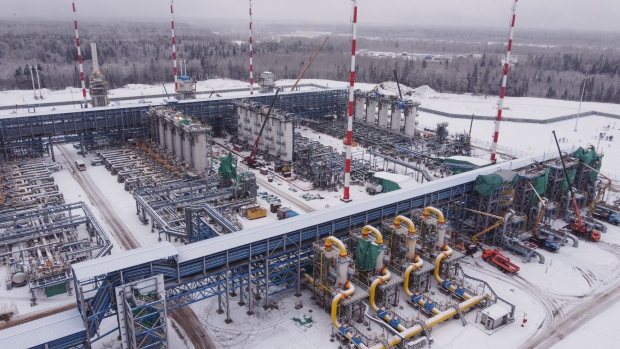Dec 16, 2021
U.S. Pushes EU to Ready Russia Sanctions Hitting Energy, Banks
, Bloomberg News

(Bloomberg) -- The Biden administration is pushing European Union allies to finalize a broad package of sanctions against Russian banks and energy companies that could be imposed jointly with the U.S. if the Kremlin attacked Ukraine, according to people familiar with the discussions.
Adding to the urgency is the fact that Vladimir Putin has shown no sign of pulling back the thousands of troops he’s amassed near his neighbor’s borders. The U.S. believes agreeing on specific sanctions options would send a firm signal to the Russian president.
It’s been more than a week since he and Joe Biden discussed the crisis.
These are the measures under consideration, according to people familiar with discussions. They are based on multiple conversations that have taken place between the U.S., U.K., Germany, France and Italy, as well as with the EU.
The EU countries say that moving too hastily to outline the measures could undermine efforts to resolve the crisis through diplomacy. The U.S. thinks the package needs to be readied in order for efforts to deter Russia be credible, according to people familiar with both points of view.
It’s not clear whether the economic measures would dissuade Putin from attacking Ukraine if he continues to view NATO outreach to Kyiv to be an existential threat to Russian security. The U.S., on the heels of the chaotic Afghanistan pullout, has little appetite for military involvement overseas.
Seeking Balance
The U.S. and the big western European countries together are trying to strike a balance between sounding like they will follow through on their threats while keeping a diplomatic dialog going, said one of the people.
To reassure NATO allies in eastern Europe who worry they could be left out of key discussions, the U.S. is pledging additional military deployments and security assistance in the event of a Russian invasion. Efforts are in the works to shore up defense plans for all other scenarios, as well.
Read more: Biden Told Putin He’d Bolster Ukraine Military If Russia Attacks
Western officials say the Russian buildup could be complete early next year, making an assault possible as soon as late January, though they say they don’t know whether Putin has decided to attack.
The Kremlin denies it plans to invade. Specific timelines are still under discussion and have not been agreed.
Read more: U.S. Intel Shows Russia Plans for Potential Ukraine Invasion
The final details of the sanctions proposals remain to be worked out and officials are still assessing the potential economic and legal impact of the measures that would be implemented in the event of an invasion. The difficulty lies in when to tell Putin what the cost of his actions would be, the people say.
The European countries, which are much more dependent on Russia for energy and other imports than the U.S., also worry about the impact some of the measures might have on key goods and their economies given their reliance on imports of energy and other products.
Swift, Nord Stream 2
Some potential steps on the list, such as cutting Russia off the from SWIFT payments system, are considered extremely problematic, the people said, citing the potential disruption of global markets for energy and other Russian exports.
Another concern is the prospect Putin might cut off gas exports -- Russia provides about 40% of Europe’s supplies -- amid surging energy prices.
The U.S. has also pushed Germany to agree to stop the Nord Stream 2 gas pipeline from Russia in the event of an invasion. While the new government in Berlin hasn’t given a public commitment on that, German regulators said Thursday that approval for the link to start operations won’t come before July 2022.
The EU wants to project a united front and leaders are expected to warn Russia of massive consequences and severe costs if it invades Ukraine as they meet in Brussels for a summit on Thursday. But there are different sensitivities among the 27 nations, with Baltic countries and Poland feeling particularly threatened given their proximity while those further West are more sanguine.
Any sanctions package would need unanimity among member states to be adopted.
Read more: Biden Infuriates Eastern NATO Allies With Outreach to Russia
The president of the European Commission, Ursula von der Leyen, wasn’t expected to go into the detail of the potential measures at a meeting of EU leaders on Thursday, according to people familiar with the situation.
A commission spokesman declined to comment on the sanctions package.
One person, who has been briefed on the EU’s paper, said the list is strong and broadly echoes the potential sanctions the U.S. is working on. It covers measures targeting:
- Russian financial institutions, banks and access to payments systems, including Swift
- Defense companies
- The energy sector, including coal, and technology exports
- A new sanctions regime on hybrid attacks, adding more individuals to existing sanctions lists and putting an end to visa-free travel for diplomatic passport holders.
Another person said that the actions the EU ultimately goes for would depend on what Russia does and developments on the ground.
©2021 Bloomberg L.P.


